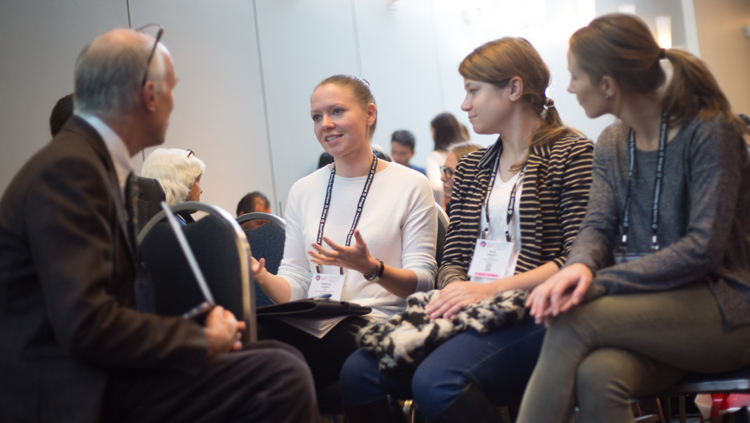Featured Panel Sessions

Featured Panel Sessions taking place during Neuroscience 2024 are listed below. All sessions will take place in McCormick Place (MCP).
View other scientific sessions being held this year.
Basic-Translational-Clinical Roundtables
Miracles Can Happen: Recent Advances in the Restoration of Vision, Hearing, and Touch
Chair: José-Alain Sahel, MD
University of Pittsburgh
Speakers: Zheng-Yi Chen, PhD; Emily Graczyk, PhD
Date & Time: Monday, October 7, 10:30 a.m.–noon CDT
Location: MCP Room S401
Theme: Theme D – Sensory Systems
This roundtable features experts who will present recent advances in sensory restoration. Dr. Chen will describe gene therapies to restore hearing in congenitally deaf children, Dr. Sahel will present approaches to restore sight partially in end-stage retinal degenerations, focusing on optogenetics and prosthetics, and Dr. Graczyk will present chronically implanted neural interfaces to restore touch and proprioception following limb loss and spinal cord injury. A discussion follows the talks.
Sex as a Biological Variable in Traumatic Brain Injury and Stroke Research
Chair: Grace S. Griesbach, PhD
Centre for Neuro Skills
Speakers: Hibah O. Awwad, PhD; Corina O. Bondi, PhD; Theresa A. Jones, PhD
Date & Time: Tuesday, October 8, 10:30 a.m.–noon CDT
Location: MCP Room S401
Theme: Theme C – Neurodegenerative Disorders and Injury
Traumatic brain injury impacts physiological pathways in a sex-dependent manner. Properly addressing sex is essential for research translation and application. The session will help define guidelines for approaching sex differences, covering considerations for experimental design, statistics, and data analysis led by an expert panel. Discussion will include logistical concerns and approaches to preclinical and clinical challenges. The session intends to be interactive and educational.
Cortical Interneurons: From the Developing Brain to the Operating Room
Chair: Derek G. Southwell, MD, PhD
Duke University
Speakers: Arturo Alvarez-Buylla, PhD; Marina Bershteyn, PhD
Date & Time: Wednesday, October 9, 10:30 a.m.–noon CDT
Location: MCP Room S401
Theme: Theme A – Development
This session will consider interneuron (IN) transplantation as a novel, cell-based therapy for human epilepsy. A panel with expertise in development, regenerative medicine, and surgical epilepsy management will discuss 1) cortical IN development and function, 2) preclinical studies of IN transplantation in animal models, 3) the generation of a clinical-grade human IN cell product (NRTX-1001), and 4) preliminary insights from a first-in-human study of IN transplantation for focal epilepsy.
Dual Perspectives
Exploring Emotions: A Dual Perspective Debate
Moderator: Luiz Pessoa, PhD
University of Maryland
Panelists: Lisa Feldman Barrett, PhD; Kent C. Berridge, PhD
Date & Time: Sunday, October 6, 10:30 a.m.–noon CDT
Location: MCP Room S105
Theme: Theme G – Motivation and Emotion
This session will contrast perspectives on the nature and mechanisms of emotions. Lisa Feldman Barrett, PhD, emphasizes the role of the brain as a generator of culturally inherited categories in constructing instances of emotion. Kent Berridge, PhD, investigates the neurobiological substrates and evolutionary foundations of motivation, hedonic affect, and emotion. Moderated by Luiz Pessoa, PhD, this panel aims to facilitate dialogue and inspire innovation within the field of affective neuroscience.
Connectomics: Opportunities and Limitations
Moderator: Davi Bock, PhD
University of Vermont
Panelists: Srini C. Turaga, PhD; Rachel I. Wilson, PhD
Date and Time: Tuesday, October 8, 1:30–3 p.m. CDT
Location: MCP Room S406A
Theme: Theme D – Sensory Systems
Two decades have passed since people began to map brain connectivity at the level of individual neurons and the synapses between them with automated volume electron microscopy. Since then, connectomes of the nematode, the larval fruit fly, portions of the mammalian brain, and, more recently, the adult fruit fly have been generated. The speakers will compare and contrast their approaches to leveraging and analyzing connectomes (e.g., at the whole-network level vs. by selecting targeted cellular pathways of interest). We will also discuss the impact, limitations, and future prospects of connectomics alone and in combination with other modalities.
Storytelling Session
How Storytelling Through Engagement and Advocacy Can Change Approaches to Neuroscience Research
Chair: Mark M. Rasenick, PhD
University of Illinois College of Medicine
Panelists: Janet Hieshetter; Thomas Schlesinger; Louise Vetter; Theresa L. Williamson, MD, PhD
Date & Time: Monday, October 7, 1:30–3 p.m. CDT
Location: MCP Room S105
Theme: Theme J – History, Education, and Society
Neuroscience is embedded into society. This session will use storytelling to describe the calibration of science, advocacy, and social impact. Specifically, how partnering with those in the community can impact how researchers frame their scientific practice and discoveries. This session will feature stories from a leading advocacy voice in neuroscience, the American Brain Coalition (ABC), and illustrate how collaboration can bring about meaningful change.




















